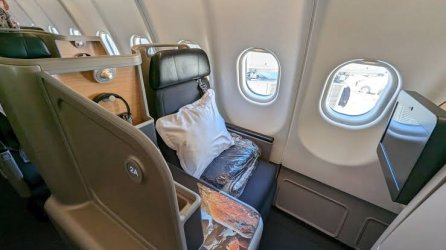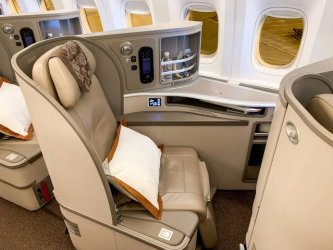You have no idea what you’re talking about. I recall it was you who posted an article on your own website as a source for a post you made on another topic. It’s obvious you see yourself as an authority but your words do not back that up.
Go and read the ACCC authorisation and show me where it says there’s a geographic restriction. It’s not there. In fact there’s a footnote saying the ACCC doesn’t feel the need to define the boundaries of the relevant markets. Yes the airlines have specified the markets as per the QF website but nowhere in the authorisation is that included. The conduct specifically states a global network for QF and EK passengers.
Functionally for pax the two arrangements are very similar for European routes. You can write a thesis on how it’s so different, but if VA and QR got the same authorisation that QF and EK have there’d be very few noticeable differences to the average pax.
This is hilarious. You seem to misunderstand the process entirely. Businesses are applying to ACCC for exemptions from the law. In order to be assessed, they have to outline the specific conduct in the application. The ACCC can only make a decision on what is asked of them.!
The application itself frames the geography! The "proposed conduct" that they applied for were connections between "
Australia and New Zealand to Asia, the UK, Europe, and the Middle East and North Africa". See paragraph 1.2 of the application.
This ACCC decision states: "
The ACCC has decided to revoke authorisation AA1000400 and grant authorisation AA1000625 in substitution to enable the Applicants to engage in the Conduct described in paragraph 1.14". Paragraph 1.14 further states "
The Applicants seek re-authorisation for the following conduct under the terms of the Agreement and other associated agreements."
So what are the agreement? Well, it's the "
Restated Coordination Agreement" which is the conduct that the ACCC approved. The proposal states that the "
Restated Coordination Agreement" is for connections between "
Australia and New Zealand to Asia, the UK, Europe, and the Middle East and North Africa". They approved the agreement in its entirely subject to the reporting conditions with respect to New Zealand. So no, the decision doesn't state the limitation, because the decision states they approved the conduct that was requested (that itself was geographically specific).
I guess you're referring to footnote 46? Are you trying to wilfully misrepresent it to get out of trouble? It doesn't mean what you say it means. It's a footnote to paragraph 4.4. Paragraph 4.4 outlines which geographic markets the ACCC's considered for their
assessment, namely: "
international air passenger services on routes between Australia and: New Zealand; countries in Asia including Singapore; the UK/Europe; international air cargo transport services between Australia and New Zealand,Australia and countries in Asia, and Australia and the UK/Europe; the Australian domestic air transport services market, in view of the significant Emirates feeder traffic to secondary Australian cities and regions." Again, they only assess based on the scope relevent to the specific conduct.
The footnote states "
However, the ACCC does not consider it necessary to precisely define the boundaries of relevant market/s". This is simply not referring to the geographic scope of the application, but to the geographic boundaries of (say) Asia or Europe.
The agreements may be functionally similar for passengers in some respects but not others. For example, the EK-QF agreement would be quite different to QR-VA in IROPS situations. But that is not at all what the broader discussion was about. The thread is about the ACCC and their affect on competition and markets in the airline industry. Many don't think they are doing a great job at the moment, and the EK-QF was a discussed example of this. Yes, I write a blog focusing on analysis, mostly data driven. I've linked that as a resource and source to support discussion. Relevent to this was the data regarding the EK-QF decision which provided analysis support for my opinion that it shouldn't have been approved due to the trans-Tasman capacity. At the time you argued that they could have carved that out, but it can't (single market). But I guess that's besides the point. Sourcing things are important when one is claiming factual statements. By blog isn't the source, rather my blog is the analysis of actual data.

















